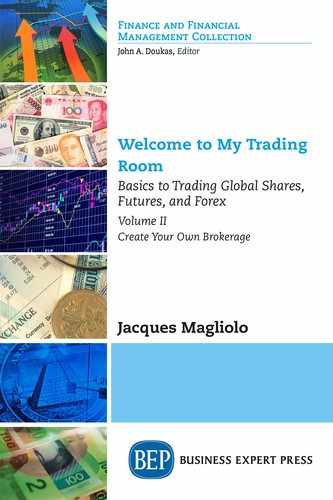Identifying a Trader’s Mental State
Technical Indicator Wisdom 9
When a support level has been broken, the share will usually produce selling on subsequent rallies.
Mental Attitude
Many years ago, In was standing in the open outcry trading floor of an exchange in the East. Despite the high humidity and extreme heat, everyone was wearing suits. The heat didn’t seem to deter their vigor in shouting and jumping up and down in unison.
Then, a lull happened in the shouting and the traders seemed to move to one side of the trading floor. It was then that I witnessed a sight which was graphic in its radical difference. A trader suddenly appeared from the crowd, dressed in jeans and a simple black T-shirt, bare feet, leather straps around his ankles, beads around his wrists, long hair, unshaven, and a complete contrast to the other professionals on the floor.
I turned to my host, and nodded. He saw what my reaction was to this particular trader and he just smiled. He said: “That is Ying. He makes more money than anyone on this floor.” Then he added: “We tolerate him.”
My host had not understood my surprise. It wasn’t that Ying was different to the others, in the way he dressed and his personal appearance. It was his mental attitude to be himself in an industry that insists on conformity. In fact, any deviation to this radical obedience to the absolute norm is never tolerated.
Now I also understood why my host had not shown surprise when he had seen me. While not as radical as Ying, I too had long hair—down to the bottom of my back, wore jeans and casual shirt and copper bangles and silver Chinese wealth symbols, and a citrine stone around my neck.
I saw my host realize that I had been looking at him, so he said: “Independent thinkers are rare in this world.”
This chapter tries to distinguish what mental attitudes make for successful trading. Essentially, how should you handle the pressures of the market; not panicking when the market falls or becoming complacent when the market roars? How do you manage your emotions toward the market and your shares so that you are calm during market storms?
William O’Niel, editor of the Investors Daily, calls this mental posture: “The most important element of stock market success.” This is the absolute confidence and belief in yourself and your decisions, without the influence of others. You carry out your deals based on a mixture of knowledge, skill, experience, and gutfeel.
And you do this without emotion. This is the true secret of a successful trader. In effect, your mental posture is how you continuously respond to:
• International and local markets in general
• Your personal portfolio of shares
The powerful emotions of fear and greed can and will have an enormous impact on exactly what you end up doing in the share market.
Overtrading
If you have conducted fundamental analysis and have technical triggers in place, why would you panic? The issue at the time is not a matter of panic or greed, but a desperate need to make money. If the decision each morning is “should I trade today?” and not “What should I trade?” then you have adhered to a specific set of criteria to either enter the market or not. However, if you don’t trade for 3 days in a row, you may start to feel pressure to enter positions in larger amounts to make up your average profits for the week.
This usually leads to overtrading, which can happen in two ways.
• You buy shares that are riskier to make up profits.
• You rely on too few trades.
The first method to avoid pressure to trade is to have six months’ funds in a money market account. That way you can use those funds to make up the difference in salary or add to that fund, that is, if you require $30,000 a month in salary, and you earn $25,000 in Month one, you would draw $5,000 from your account. In Month two, if you earn $40,000, you would replenish your fund with the amount you withdrew; use the additional funds to pay off mortgages and so on.
This way, you always have a six month salary in place to support you during tough trading conditions and it removes the pressure to trade.
The rule for the second type of overinvesting is to manage your portfolio to ensure that it is always balanced. So, if you have 10 shares worth $10,000 each, then you would limit any trade to 10 percent of the portfolio. As your portfolio grows, you will have diversified and reduced your risk exposure to any single share. This will significantly improve your mental posture.
Overtrading is a major problem with novices in trading stocks, as you are set up for a panic ride if the shares fall to your stop losses. You will think that your entire portfolio is at risk now and its value is falling; a direct result from simply having too much money invested, compared to what you can emotionally handle.
Take heart, this is normal when you are starting your trading career. Experience and skill should eliminate such fears.
In the later volumes we structure the development of a trading strategy to enable you to trade all forms of securities.
